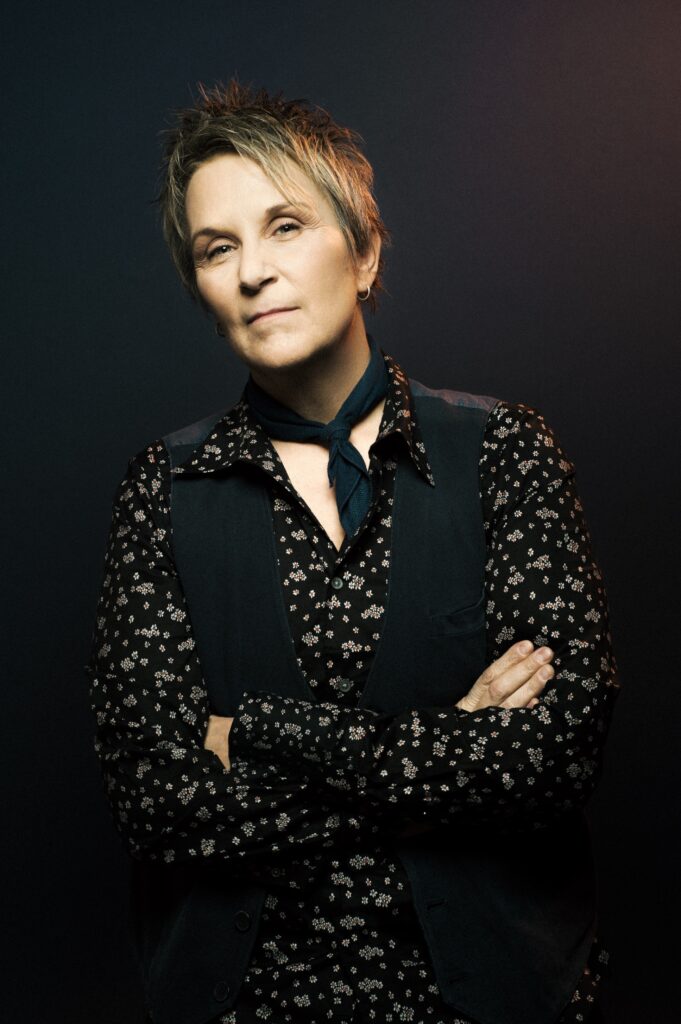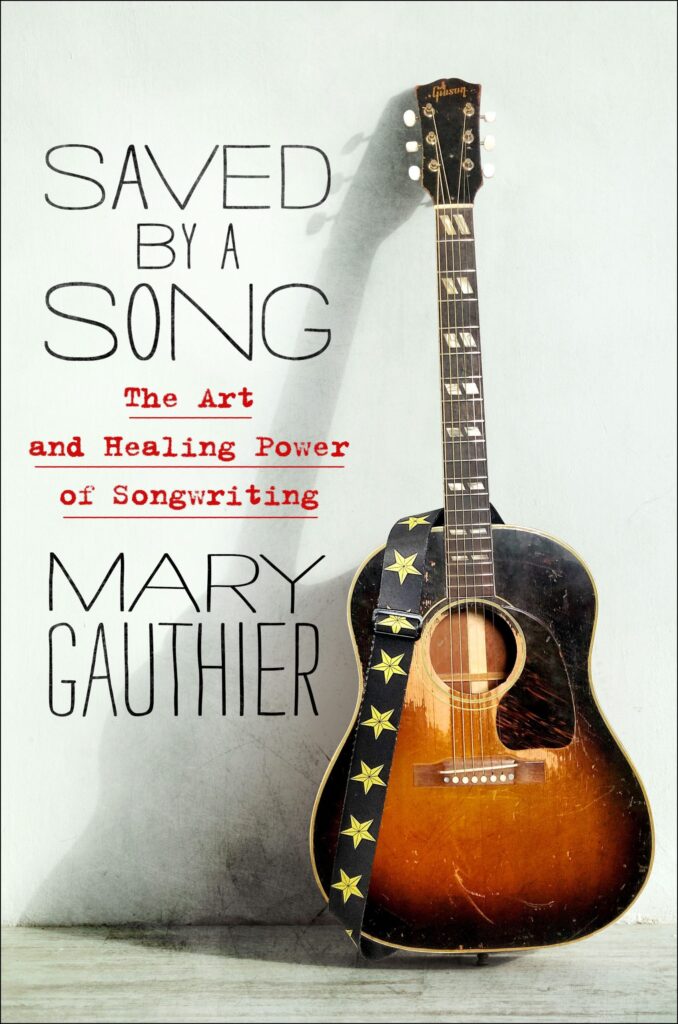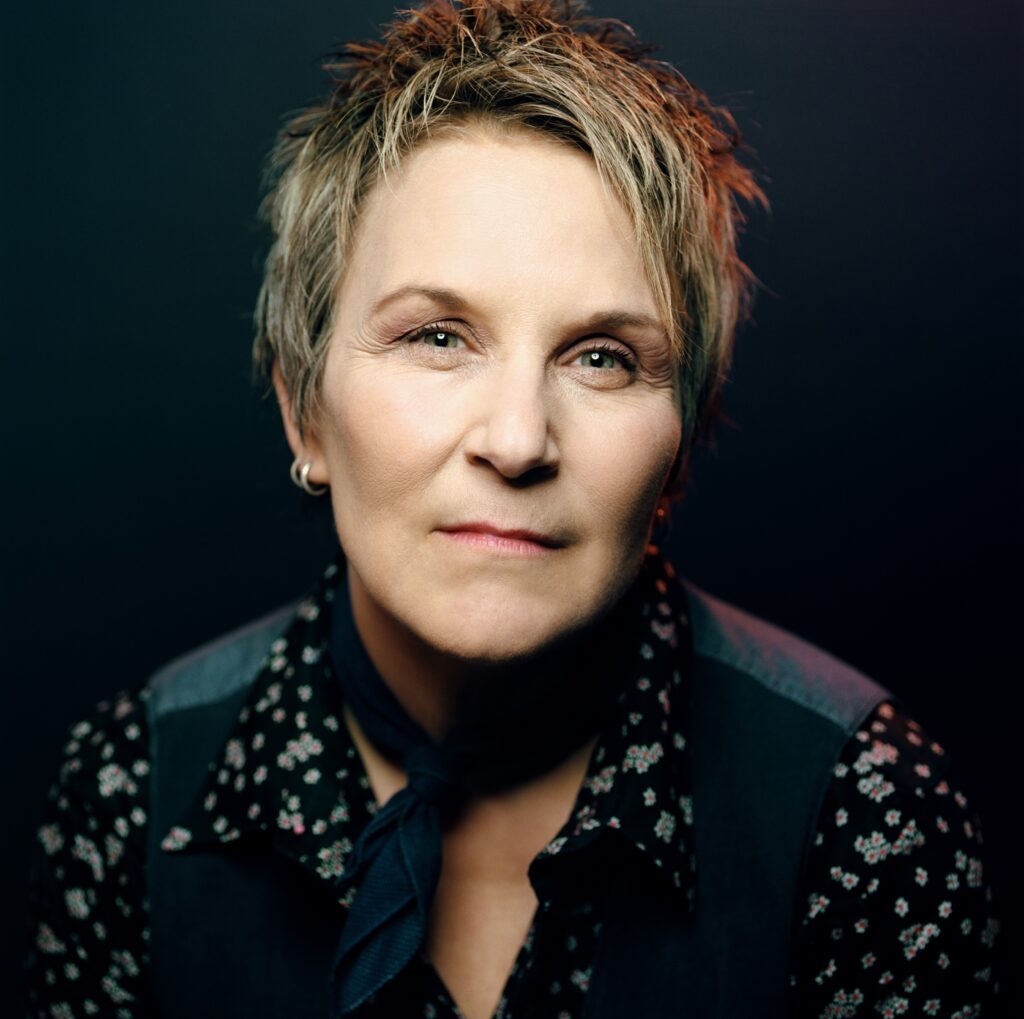Music is magic for out folk singer Mary Gauthier
Grammy-nominated American folk singer-songwriter Mary Gauthier made the music scene and our own community take notice with her 1999 album Drag Queens in Limousines. Several albums later she has now written a powerful memoir.
I first found out about Mary Gauthier (pronounced Go-shay) just over a decade now. Her 2010 The Foundling jumped out at me from the dozens of albums I receive every month and quite literally blew me away. Not long after that, I met Gauthier for the first time when she was visiting New York City. To say she was an interesting interview would be putting it mildly.
Gauthier has been based in Nashville for years but was actually born in Louisiana, where she was adopted as an infant. Her adoption, pervasive sense of rootlessness, and search for her birth mother is what inspired The Foundling and its harrowing centerpiece, “March 11, 1962.” When she was fifteen she ran away from home, recalling that “I was a gay kid, and back then, that just didn’t fly. Back then, gay kids were taking their own lives. It was horrible, and I just wanted to get away.”
The Foundling was actually her sixth album; Gauthier’s debut, Dixie Kitchen, came out in 1997. She was 35 years old at the time, newly sober and finally pursuing music — her first love — after a stint in the restaurant industry.
Since The Foundling, Gauthier has released only two more studio efforts: 2014’s Trouble and Love, a remarkable song cycle about an unhealthy relationship, and Rifles and Rosary Beads, which arrived four years later. Gauthier did something totally different on Rifles: she cowrote a group of songs with military veterans, turning their painful experiences into art and looking outside herself for really the first time in her songwriting career. The album earned Gauthier her first Grammy nomination.
Beyond her albums, Gauthier’s star has risen in recent years in general. Her songs have been recorded by a variety of artists, ranging from Blake Shelton to Boy George! She teaches songwriting workshops — both for veterans and beyond. During the pandemic, she launched a weekly podcast called “Sundays with Mary.” And just last month, she released her first book. Saved By A Song (Macmillan/St. Martin’s), is half biography and half songwriters’ manual. Gauthier does a masterful job of combining the two and of explaining how some of her most difficult experiences — kicking drugs and alcohol, searching for her birth mother, enduring a series of breakups — inspired some of her best work. We caught up by phone recently and discussed her book and other subjects.

It’s been a long time since we spoke. A lot has happened, both in the world and in your career. I wanna ask you about the book. But before I do that, I wanna get your take on life during lockdown and how the last year and change was for you.
Mary: Okay. What I was able to do was pivot pretty quickly into online streaming. We built this little Sunday show that we’ve done for — I don’t know, 56 weeks now, [maybe] 57 — where I bring in a guest songwriter or an author, and we do a little conversation and play some songs. Or they do a reading. So we’ve stayed social and connected with fans around the world every week. That was a surprising success, and we’ll keep it goin’ as best we can as we’re makin’ our way back into the 3-D world… [It] gave us something [to look forward to] every week. To keep us playing, to keep us connected, to keep us in contact with our friends.
So that was mainly what we did. And I finished the book, which was important. In the first coupla months of the pandemic, I was able to complete it. Now we’re just in the big media push.
Well, let me ask you about that. I’ve seen you say once or twice online that this book was actually six years in the making. This is really your first book and I didn’t know what to expect. It’s about songwriting, but it’s also very much about you.
Mary: Yeah. It’s both a memoir and a conversation with fellow songwriters about songwriting. I used the memoir to move the discussion of songwriting forward. So I tied the songs into my personal story. What started as a book for Yale University grew into a book for St. Martin’s Press. So it went through two pretty big publishers finding a home. It wasn’t something I would have done without that. Yale came to me and asked me to write a book for ‘em; that’s where it all began. So I did, but that did not end up being published. Then St. Martin’s came to me and asked me if I would revise that — expand it more outward into stories and memoir. So that was really the incentive.
It’s really well done, Mary. The first chapter — not the intro, but the “I Drink: Reduction” [chapter] — is very moving on a number of levels. Something about it reminded me of the opening song on Trouble and Love in the sense that you cut away all the bullshit and small talk. You open the book with this traumatic event and then sort of go into recovery. I don’t know if I’m the only person who reacted that way. But it was very powerful and very open, too.
Mary: You know, Dave, it became clear I needed to start there. The book is called Saved By A Song — so, saved from what? So I made it clear that, you know, number one on the list [was] addiction. I didn’t start writing songs until after I got sober. And I got sober because I got arrested [for drunk driving]. And that’s where that moment of clarity came. It just felt like an opening scene to me. [It] explained the title of the book and also opened the door to “here’s how I became a songwriter.” I quit drinking, I put down the drugs and I [suddenly] had a lot of time on my hands. I ended up at Club Passim and a lightbulb [went off]. That’s kind of a Forrest Gump story! I keep finding myself in these amazing situations over and over again.
It would seem that way from reading the book!
Mary: And it’s still happening! It’s astonishing to me, it really is! (laughter)
Another part of that chapter that I found moving — and I didn’t know about this until I read it — was your love of the Indigo Girls. When you’re driving and “Strange Fire” comes on the radio, [that’s] another very powerful scene. Having had the chance to interview Amy and Emily — like yourself, they’ve always struck me as two special human beings. I often think they don’t get the credit they deserve. I think the world sort of takes them for granted a little bit.
Mary: Yeah, I think so too. I think that what they did was cataclysmic. I mean, just to put it quite frankly, they blew it up! Suddenly, thousands of women were screaming for women in a highly erotic way. These women did not look like straight women. They did not abide the gender rules that women in the music business have always abided — even the ones who think of themselves as badass rockers. [Those women] all looked straight. The Indigo Girls never looked straight. Even if they weren’t out, they looked gay. But yeah.
The first time I heard the Indigo Girls, I was drunk. I was miserable. I was in my filthy chef coat after working a 12-hour shift at the restaurant. I pulled up in front of the house and let the song play out. And something in it just hurt me so bad; it cut through something that I didn’t understand and it ached. It wasn’t the kind of sadness you get from a sad song; it was something way, way bigger. I couldn’t figure out what it was, but it was profound for me.
Mary Gauthier
Pretty soon after that, I got arrested for drunk driving. And I somehow either saw a show poster or heard on the radio that they were playin’ at the Paradise, and I went to go see ‘em. That was when “Closer to Fine” was climbing the charts and they were well on their way to becoming icons. And when I went to go see ‘em, the same feeling came over me but even stronger. I still didn’t know what it was — [but] in retrospect I know. It was the pain of an unlived life. They were pointing the way for me to become a songwriter. And their presence in the marketplace made it possible for so many of us to imagine ourselves up there! They were very human. you know? They weren’t Shania Twain.
And Amy and Emily’s voices is a form of alchemy; we can’t explain it in words, but we know it. It’s one plus one equals 10!
I wanna jump a little further ahead in the book. I first spoke with you after The Foundling came out which, insanely, is over 10 years ago now —
Mary: Oh my God! Wow, it goes fast.
It does; too fast. And then we talked again after Trouble and Love. But I kind of missed the part of your life where you were writing with veterans and recording Rifles and Rosary Beads. [So] I wanted to ask you a little more about that. I feel like you’re doing it at a very important time because I don’t think the political climate in America has ever been as divided as it is now. It feels to me like you’re bringing people from different parts of America together by doing this; it’s more than just about music.
Mary: Yeah, I’d have to agree with you on that. And I think that the bridge building happens when you sit in non-judgment, bear witness and try to help someone who’s in pain to articulate what they’re going through. Sittin’ and bearing witness has been a big part of this. You know, I was afraid that they would be homophobic. And what I found out is that that was a stereotype. I’ve been warmly embraced by every soldier I’ve written with — to the point of us weeping in each other’s arms! My stereotyping of them was probably more intense than anything that came at me in terms of homophobia. So I had to take a look at that.
I had to take a look at that. We all have ideas of who we think people are gonna be, based on categories. That’s a very human thing to do but it hardly ever works out that way. People are individuals. And I’ve learned so much from these women and men who served. I’m continuing to do this work — I have another retreat in coming up in August — and I never leave without learning something. It’s been a real education for me.

It’s fascinating, what you just said about looking at your own prejudices and that being heavier than any homophobia that might be directed at you. I have to be honest: I’ve been guilty of stereotyping Trump supporters. Absolutely.
Mary: It’s hard not to.
If you have to look at the latter part of 2021 [and] first half of ’22 — tell me a little about what you have planned in terms of the book, in terms of touring. Anything that maybe I don’t know?
Mary: Yeah, we’re making up tour dates right now. We’re pretty much booked solid through the end of November. So we’re doin’ makeup dates and addin’ on a few festivals. We’re swingin’ out to Denmark to play a festival, so there are some international dates. And then on this book tour — well, I wouldn’t even call it a book tour. I’m reading passages from the book at shows and selling the book at shows. The old school book tours might be a thing of the past. I think publishers realize, “Shit! It works just as good on Zoom and it doesn’t cost us any money.” And I think writers are perfectly happy to sit at home and do it instead of goin’ form place to place without being compensated. That’s the thing: writers don’t get paid on book tours. That kinda was like, “Wow!” for me. But I’ll be doin’ six or seven events. I’m honored to have Brandi Carlisle interview me for an event for a Seattle bookstore… We’ll do that on Zoom. And I’ve got about six or seven of those type of events.
And then I’ll go into the studio in December. I’m closin’ in on a new record. We’ll see how that goes. Nothin’s for sure; everything’s loose. You know, after last year, one thing we know [is that] everything can change on a dime. So we’re tryin’ to take it lightly. But [I’m] really happy to be back on the road. Every show on this run so far has been sold out — and that feels great. And, you know, doin’ what we did before the Great Pandemic of 2020.
Buy a signed copy of Saved By a Song here.
See Mary’s tour dates here.






